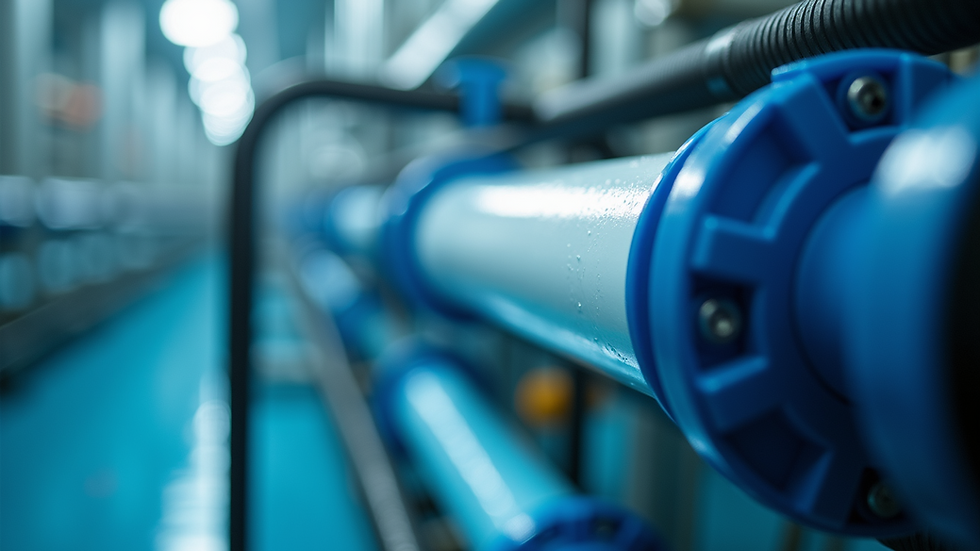Key Features to Look for in a Reliable Yacht Water System
- Omri Farbstein

- Nov 3, 2025
- 3 min read
When outfitting a yacht, one of the most critical components to consider is the water system. A dependable water system ensures fresh, clean water is available for drinking, cooking, cleaning, and bathing throughout your voyage. Without it, life onboard can quickly become uncomfortable and inconvenient. Understanding the key features to look for in a yacht water system can help you make an informed decision that enhances your boating experience.
Understanding the Importance of a Yacht Water System
A yacht water system is more than just plumbing; it is a complex network designed to provide safe and reliable water supply under varying conditions at sea. The system must handle water storage, filtration, pressurization, and sometimes desalination. Each component plays a vital role in maintaining water quality and availability.
For example, a high-quality filtration system removes contaminants and ensures the water tastes fresh. Meanwhile, a pressurization pump guarantees consistent water flow to taps and showers, even when the yacht is rocking on the waves. Without these features, water supply can be unreliable or unsafe.

Close-up view of yacht water filtration system components
Essential Features of a Yacht Water System
When selecting a yacht water system, several features stand out as essential for reliability and convenience:
1. Efficient Water Filtration and Purification
Water quality is paramount. Look for systems that include multi-stage filtration, such as sediment filters, activated carbon filters, and UV sterilizers. These stages remove particles, chlorine, odors, and harmful microorganisms. Some advanced systems also incorporate reverse osmosis for desalination, turning seawater into potable water.
2. Adequate Water Storage Capacity
The size of your water tanks should match your yacht’s size and typical crew/passenger count. Larger tanks reduce the frequency of refills, which is especially important on longer trips. Tanks made from food-grade materials prevent contamination and maintain water freshness.
3. Reliable Water Pressure System
A consistent water pressure system ensures that water flows smoothly from faucets and showers. Look for pumps with adjustable pressure settings and built-in protection against dry running or overheating. Quiet operation is a bonus to maintain onboard comfort.
4. Easy Maintenance and Accessibility
Yacht water systems require regular maintenance to function optimally. Choose systems with accessible filters and components that can be serviced without specialized tools. Clear instructions and modular parts simplify upkeep and reduce downtime.
5. Energy Efficiency and Power Management
Since yachts rely on limited power sources, energy-efficient water systems are preferable. Pumps and filtration units that consume less power help conserve battery life and reduce fuel consumption. Some systems offer automatic shutoff features to prevent waste.

Eye-level view of yacht water storage tanks installed in engine room
How to Choose the Right Yacht Water System for Your Needs
Selecting the right system depends on your yacht’s size, usage patterns, and cruising locations. Here are some actionable tips:
Assess your water consumption: Calculate daily water needs based on the number of people onboard and planned trip duration.
Consider water source availability: If you often dock at marinas, you may rely more on refilling tanks. For extended offshore trips, a desalination system might be necessary.
Evaluate space constraints: Some yachts have limited room for tanks and equipment. Compact, integrated systems can save space.
Check compatibility with existing systems: Ensure the new water system integrates smoothly with your yacht’s plumbing and electrical setup.
Prioritize safety certifications: Look for systems certified by marine safety organizations to guarantee compliance with industry standards.
Installation and Upkeep Tips for Optimal Performance
Proper installation and regular maintenance are crucial for a yacht water system’s longevity and reliability. Here are some best practices:
Professional installation: Engage experienced marine technicians to install the system, ensuring all connections are secure and leak-free.
Routine inspections: Check filters, pumps, and tanks regularly for wear, leaks, or blockages.
Water quality testing: Periodically test water for contaminants, especially if using onboard desalination.
Winterizing procedures: If you store your yacht during cold months, drain and protect the water system to prevent damage.
Keep spare parts: Stock essential replacement parts like filters and pump seals to minimize downtime during trips.
Enhancing Your Yacht Experience with a Quality Water System
A well-chosen and maintained water system significantly improves life onboard. It provides peace of mind knowing that fresh water is always available, no matter where you sail. Whether you are enjoying a quick weekend getaway or a long ocean voyage, the right system supports comfort, hygiene, and safety.
For more detailed insights and product recommendations, explore resources dedicated to yacht water systems. One such resource is the yacht water system blog, which offers expert advice and the latest innovations in marine water technology.
By investing in a reliable yacht water system, you ensure your vessel is equipped to meet your water needs efficiently and safely, making every journey more enjoyable.




